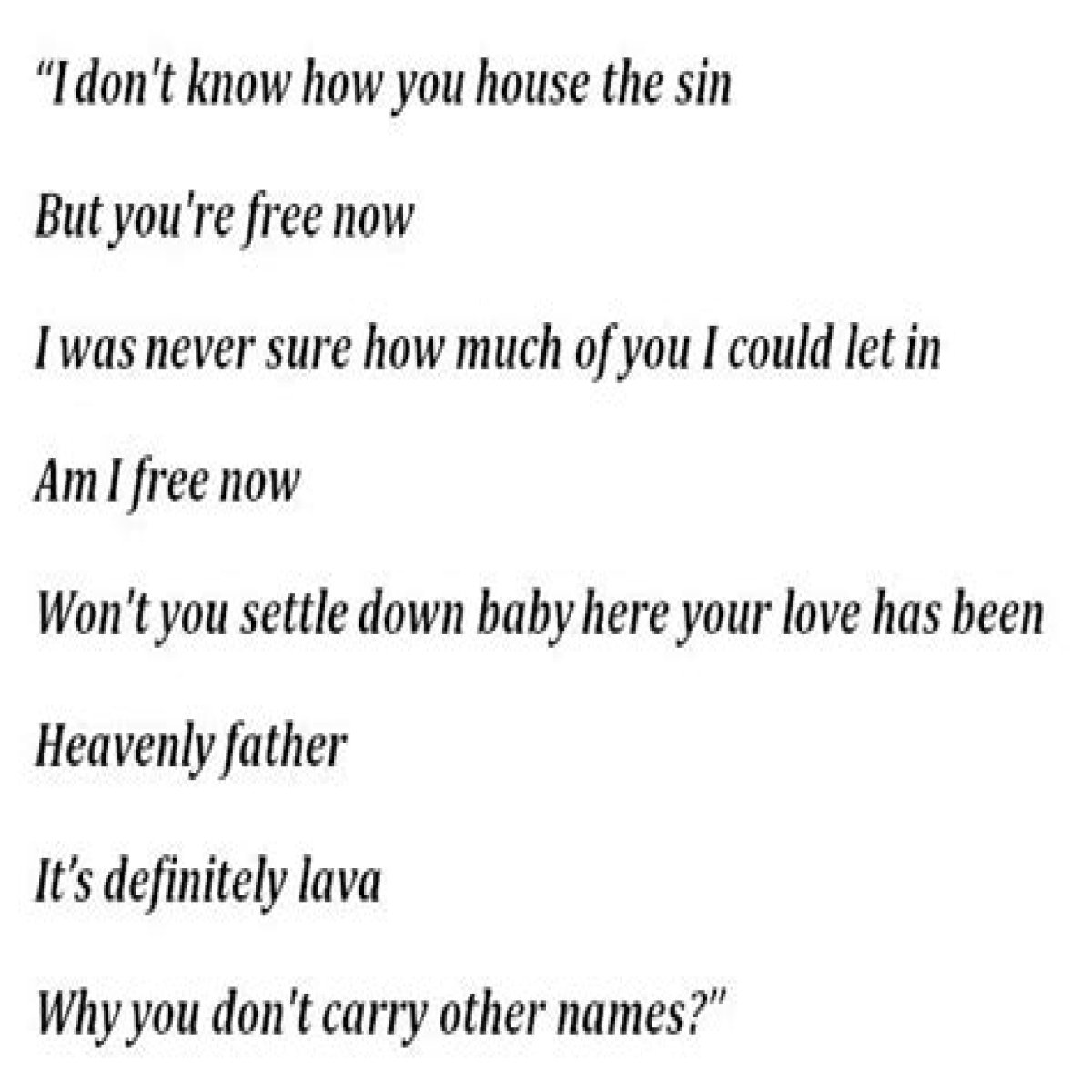Heavenly Father, a powerful yet introspective song by Bon Iver, beautifully captures the complexities of human emotions and the search for meaning in life. Released in 2014 as part of the soundtrack for the film “Wish I Was Here,” the song quickly captivated listeners with its haunting melodies and deeply evocative lyrics.
At its core, “Heavenly Father” touches upon themes of yearning, vulnerability, and the existential questions that often plague the human spirit. The lyrics delve into the struggle to find purpose and a sense of belonging in the world. Bon Iver’s lead singer, Justin Vernon, expresses a profound longing for guidance and connection, seeking solace in the spiritual realm. The poignant lyrics resonate with listeners as they navigate their own personal journeys and seek understanding in a seemingly chaotic world.
- Frequently Asked Questions About Heavenly Father by Bon Iver
- 1. What inspired Bon Iver to write “Heavenly Father”?
- 2. What does the title “Heavenly Father” signify in the context of the song?
- 3. Are there any specific events or experiences that influenced the creation of “Heavenly Father”?
- 4. How does “Heavenly Father” make listeners feel?
- 5. Has “Heavenly Father” won any awards or received critical acclaim?
- 6. Can the meaning of “Heavenly Father” be interpreted differently by listeners?
- 7. How does the instrumental arrangement contribute to the overall impact of the song?
- 8. Has “Heavenly Father” been performed live by Bon Iver?
- 9. Are there any covers or reinterpretations of “Heavenly Father” by other artists?
- 10. Can “Heavenly Father” be considered a form of catharsis for listeners?
- 11. What other songs by Bon Iver explore similar themes as “Heavenly Father”?
- 12. Can “Heavenly Father” be considered a timeless piece of music?
Frequently Asked Questions About Heavenly Father by Bon Iver
1. What inspired Bon Iver to write “Heavenly Father”?
The exact inspiration behind the song remains known only to Justin Vernon. However, it is clear that the lyrics reflect a deeply introspective and contemplative state of mind. The spiritual undertones suggest a search for higher meaning and a thirst for connection with a divine presence.
2. What does the title “Heavenly Father” signify in the context of the song?
The title “Heavenly Father” refers to a higher power or deity that individuals often turn to during times of distress and introspection. Through this title, Bon Iver explores the desire for guidance, support, and a sense of purpose beyond the material world.
3. Are there any specific events or experiences that influenced the creation of “Heavenly Father”?
Bon Iver keeps the specifics of their song inspirations private, allowing listeners to interpret the lyrics based on their own unique experiences and emotions. However, it is likely that personal life experiences, universal struggles, and the search for meaning influenced the creation of this moving song.
4. How does “Heavenly Father” make listeners feel?
The song’s haunting melodies, paired with profound and introspective lyrics, often evoke a mix of emotions in listeners. Some may find solace and comfort in the relatable themes of searching for meaning and guidance, while others may experience a sense of melancholy or introspection.
5. Has “Heavenly Father” won any awards or received critical acclaim?
While “Heavenly Father” did not win any major awards, it received critical acclaim for its poignant songwriting and emotional delivery. It solidified Bon Iver’s reputation as a profound and talented artist, further establishing their unique musical style and ability to connect with audiences.
6. Can the meaning of “Heavenly Father” be interpreted differently by listeners?
Absolutely. One of the remarkable aspects of Bon Iver’s music is its ability to resonate with individuals on a personal level. Each listener may interpret the song’s meaning based on their own unique experiences, beliefs, and emotions, allowing for a deeply personal connection to the music.
7. How does the instrumental arrangement contribute to the overall impact of the song?
“Heavenly Father” is characterized by its atmospheric and ethereal soundscapes, created through layered vocals and intricate instrumentals. The haunting melodies and the interplay of various musical elements perfectly complement the introspective and emotive lyrics, intensifying the overall impact and emotional resonance of the song.
8. Has “Heavenly Father” been performed live by Bon Iver?
Yes, Bon Iver has performed “Heavenly Father” in various live settings. The song’s profound themes and captivating melodies make it a powerful addition to their live performances. The band’s charismatic stage presence and the raw emotions conveyed during their live renditions further enhance the impact of the song.
9. Are there any covers or reinterpretations of “Heavenly Father” by other artists?
“Heavenly Father” has inspired numerous covers and reinterpretations by both established and aspiring artists. These renditions showcase the song’s timeless appeal and its ability to resonate across genres and artistic styles.
10. Can “Heavenly Father” be considered a form of catharsis for listeners?
As with many emotionally charged songs, “Heavenly Father” can indeed serve as a form of catharsis for listeners. Its deeply evocative and introspective lyrics, combined with the raw vulnerability in Justin Vernon’s delivery, can provide solace and comfort to those seeking emotional release or a sense of understanding.
11. What other songs by Bon Iver explore similar themes as “Heavenly Father”?
Bon Iver’s discography is replete with songs that delve into introspection, longing, and the complexities of the human experience. Tracks like “Holocene,” “Skinny Love,” and “Flume” share similar themes and evoke emotional responses akin to “Heavenly Father.”
12. Can “Heavenly Father” be considered a timeless piece of music?
Given its profound and introspective nature, as well as Bon Iver’s ability to connect with listeners on a deeply emotional level, “Heavenly Father” has the potential to withstand the test of time. Its universal themes and haunting melodies make it a song that can resonate with audiences for generations to come.
